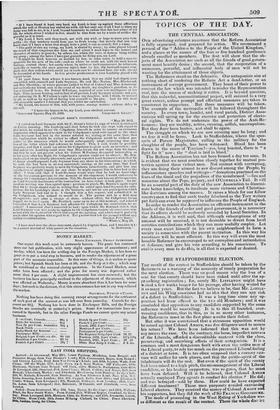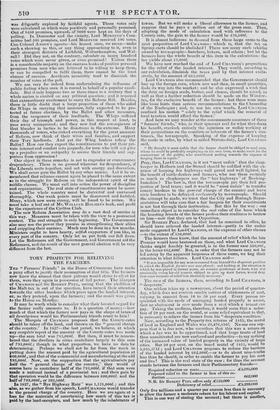THE STAFFORDSHIRE ELECTION.
THE result of the contest in Staffordshire should be taken by the Reformers as a warning of the necessity of timely preparation for the next election. There was no good reason why the loss of a seat for that county should have been risked until after the ap- proaching registration ; fur, surely Mr. LITTLETON might have waited a few weeks longer for his peerage, after having waited for it so many years. But the fact we believe to be, that Mr. LITTLE- TON and his Whig associates had no idea that they ran any risk of a defeat in Staffordshire. It was a long time since any op- position had been offered to the two old Members; and it was concluded that opposition to any candidate supported by the same influence would be unavailing. It is to this ill founded, over- weening confidence, that in this, as in so many other instances,. the Reformers must in the first place ascribe their defeat. But after it was ascertained that a strenuous opposition would be raised against Colonel ANSON, was due diligence used to secure his return ? We have hien informed that this was not by any means the case. On the contrary, the loose, imperfect canvass of the Liberals, afforded a discreditable contrast with the close, persevering, and searching efforts of their antagonists. It is a common and a most dangerous fault with even the active men of the Liberal party, to rely too much on the presumed Liberal feeling of a district or town. It is too often supposed that a cursory can- vass will suffice for such places, and that the public-spirit of the inhabitants will do the rest. But even if the spirit of the county had been raised to a high pitch, the mismanagement of the Liberal candidate, or his leading supporters, was so gross, that he must have heen defeated. Will it be believed, that Colonel ANsoN actually employed Tory agents to conduct his election ? He did; and was betrayed—sold by them. How could he have expected different treatment? These men purposely avoided canvassing Liberal electors. They received the money of Colonel ANSON and his supporters, but they (lid the work of Sir FRANCIS Gomm:msg. Tile mode of proceeding in the West Riding of Yorkshire w.a* as different as the result of the contest. There the whole dist7 lot
was diligently explored by faithful agents. Those votes only were calculated on which were positively and personally promised. Out of 9400 promises, upwards of 9000 were kept on the days of polling. In Doncaster and the vicinity, Lord MORPETH'S Com- mittee had 506 promises, and Lord MORPETH received 506 votes. Can Colonel Amory's agents—his honest ones, we mean—make such a showing as this, or any thing approaching to it, even in their strongest districts of Lichfield, Wolverhampton, and NVal-
sall ? Did they not, on the contrary, calculate on many hundred
votes which were never given, or even promised? Unless there is a considerable majority on the canvass-books of positive personal
promises from men who are believed to be willing to keep them, or can be compelled to fulfil them, there cannot be the least chance of success. Accidents invariably tend to diminish the number of votes at the poll.
We are very far indeed from undervaluing the influence of public feeling when once it is roused in behalf of a popular candi- date. But it only happens two or three times in a century that a whole nation is excited on any political question ; and it required that extraordinary excitement to carry the Reform Bill. Besides, there is little doubt that a large proportion of those who aided the Whigs in carrying that measure, fully expected to be pro- tected at future elections, by the Ballot and other measures, from the vengeance of their landlords. The Whigs suffered their day of triumph and power, in this respect at least, to pass away unimproved; and they now find the consequence of that blunder in tactics to be disastrous in the extreme. Many thousands of voters, who risked everything for the great measure of Reform, now think of their wives and families, and support
their Tory landlords. And yet the Whig leaders refuse the Ballot! How can they expect the constituencies to put their pri- vate interest and comfort into jeopardy, for men who will not give up a prejudice or an antipathy to secure their friends and sup- porters from oppression ?
Our object in these remarks is not to engender or countenance despondency. There is no ground whatever for despondency, if the Liberals unite together, and act with energy and discretion. We shall never gain the Ballot by any other means. Let it be re- membered that reliance cannot again be placed to the same extent as in the struggle for Reform on the independent spirit of the middle classes. We must call into action the power of discipline and organization. The real state of constituencies must be ascer-
tained. The whole country must be districted and canvassed thoroughly. Our weak points must be discovered and fortified. Many, which now seem strong, will be found to be rotten. We must take a leaf out of Mr. WILLIAM HOLMES'S book, and profit by the experience of the Carlton Club. The new Reform Association may do a vast deal of service in this way. Measures must be taken with the view to a protracted contest. The real struggle is only beginning. The Government also may use the power they possess in strengthening their allies and crippling their enemies. Much may be done in a few months. Ministers ought to have hearty, selfish supporters if you like, in every part of the country. Only let us put forth our full force. Let the Reformers aid the Government, and Government aid the Reformers, and the result of the next general election will be very different from the last.



























 Previous page
Previous page